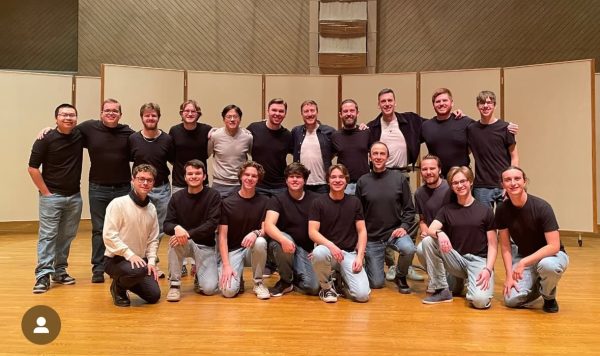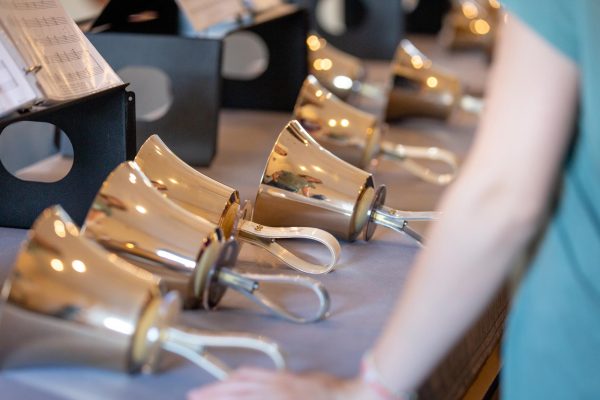Everybody Takes Center Stage
As the lights come up on stage and the audience fades, the observer notices the performance has already begun. Who you thought was the usher guiding people to their seats comes to stage and reveals their role as an actor in the show. An explanation soon follows, where the unique nature of the play is revealed.
Everybody, written by Branden Jacob-Jenkins, was chosen as the spring play by Associate Professor of Theatre Robert Vrtis. It is a modern adaptation of the show Everyman, which was written in the 15th century, and is one of the first recorded plays in the English language. Opening night was on Friday, April 22 at 7:30 p.m. and Saturday, April 23 at 9:30 p.m. The weekend after featured shows on the 28th at 7:30 p.m, the 29th at 7:30 p.m, and the 30th at 2:30 and 7:30 p.m.
The show starts with five actors being pulled onto the stage, where it is revealed that they are dead and need to give a presentation about how they lived their lives. They bargain with “Death” to let them find someone they can bring with them to help with their presentation. All of the actors then participate in a lottery system, where they determine who will play what role in the show. “Everybody” is the main character, who is trying to find someone to bring with them in death: Friendship, Kinship, and Stuff. All of these roles are decided by the lottery system on stage during the show, meaning the show is different every night with 120 possible combinations of actors in different roles.
Josie Ramler (‘23) drew the role of Everybody for opening night. They were not expecting to be the main character for the first performance, but they were nonetheless prepared.
“At first, I wasn’t excited when I saw that it was the last ball because “Everybody” is such a taxing role, and you’re onstage all of the time,” Ramler said. “You have four different people you interact with and explain what you’re doing and what your goal is, and four different ways you need to do it. It’s a lot of pressure from memorization and knowing where you need to be at all times, and making sure nothing slips from your head. [However], as the performance went on, I got less nervous because I realized I did know what I was doing.”
Not only is playing the lead in the show physically taxing, but it is also emotionally taxing for the actors who do not know what role they are going to play until after the show starts. Once they find out, there is no time to prepare for who will play which role, because the show continues without a pause.
“This process for Everybody has been really difficult, because there are so many things that are up in the air,” Ramler said. “You don’t know what the night is going to look like when you start it out, so that leads to a lot of uncertainty and anxiety, but I think that is part of the beauty of this show. It is reflective of someone’s life; you don’t know when you are going to die or what is going to happen afterward. Those are the questions we avoid asking ourselves because they are hard questions and existentialism and feel very melodramatic. ”
The process of preparing for this show was months in the making. Actors were cast in November, and rehearsals began in February. In addition to the work that took place on stage, there was also a lot of work done behind the scenes. Mattie Snyder (‘24) worked on putting costumes together and decorating set pieces for the show as a Costume Shop employee, and was thrilled to finally see the show take place. She spoke about how the unique lottery system made her see the cast as a closer unit.
“I thought that the lottery system was especially cool,” Synder said. “You get to see them adjust to the role that they’re going to play that night. I think that’s something cool–that they all have it memorized, they seem more like a unit, they all know what’s going on.”
Although there were five people whose roles change every night, there were people with stagnant roles who are not involved with the lottery system. Lauren Siems (‘24) played Usher, God, and Understanding. Although she did not have to worry about changing roles, she still had to work hard on the characterization of her role.
“In the beginning, I had at least six pages of just me talking,” Siems said. “All of us had to work really hard on our characterizations because [Vrtis] explained to us that he cast us the way he did as ourselves. He saw things in us that he wanted us to present in the characters. I struggled with my “Usher” character for a long time, because I wasn’t sure what parts of myself I should bring out or what was the best thing. Eventually I found my niche, and I am really proud of that.”
Both actors spoke on the uniqueness of the play. Not only does the lottery system make the show unique, but the show also brings up difficult and taboo questions about death.
“I think it really is a show for everybody,” Siems said. “It is a difficult piece to digest because it talks about death so bluntly. No one is going to follow you, it is just going to be you, and I don’t know what happens. Our friends can turn out to be fake and not always be there for us. Our stuff is just stuff; it doesn’t do anything for us. I hope that anyone who watches it walks away with a different perspective of how they treat people and how they live their life.”
Everybody was the last stage production for the VPA in spring 2022, but the dance studio will be presenting Sensing Identity in the last weekend of May. Until then, returning students can keep an eye on their emails for audition information for the 2022-2023 season to hit their inboxes this summer.






